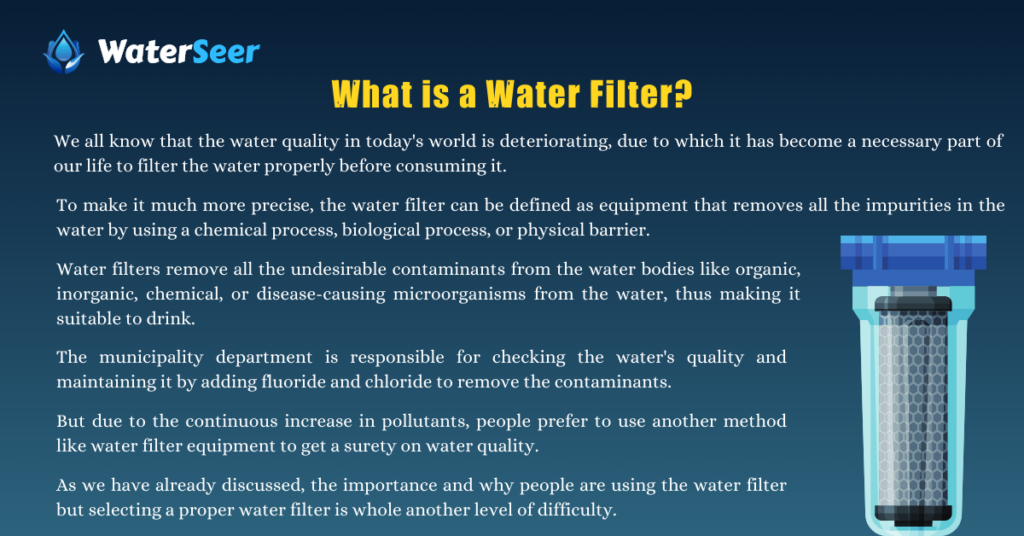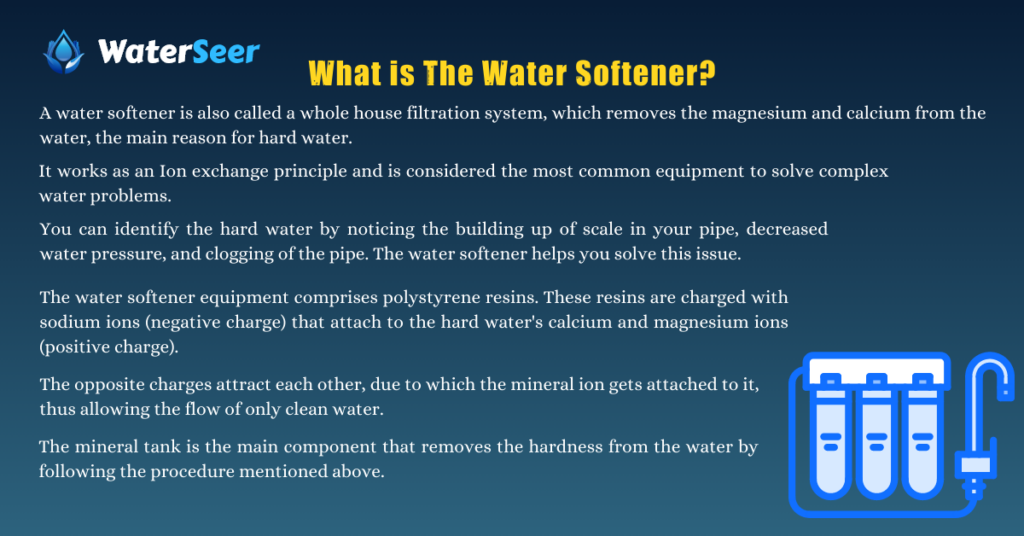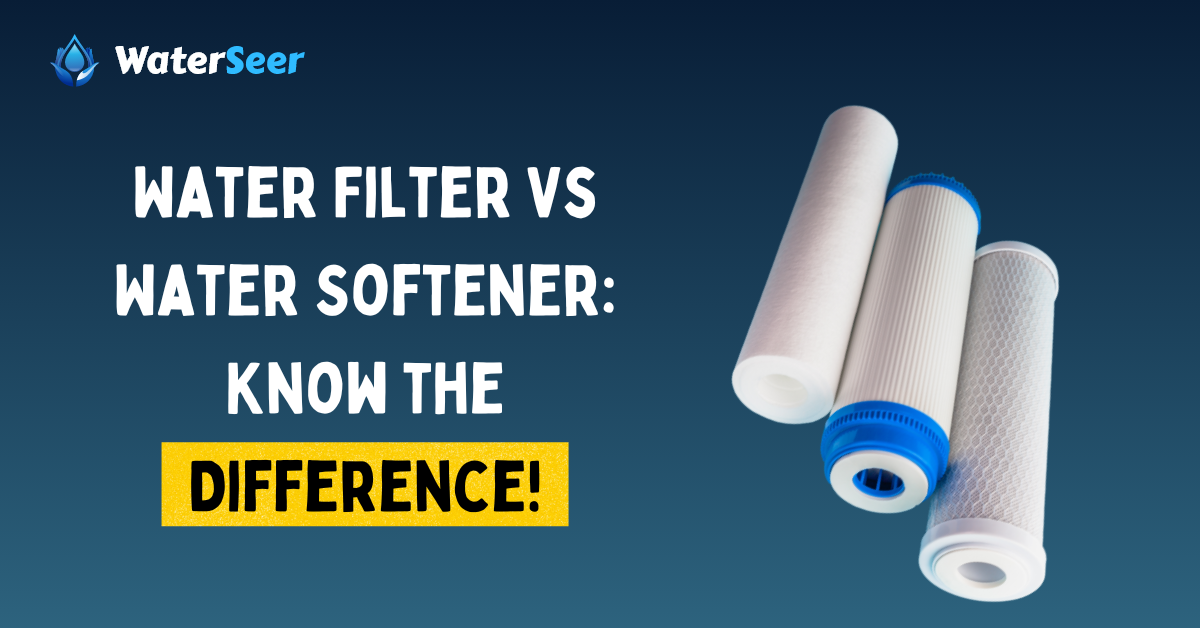Health is the topmost priority of every individual, and we all know water quality influences it considerably. Every cell in our body wants water to function.
The world is avoiding drinking water directly from the water sources or the water faucet (coming into your home), as it is highly possible to be unsafe.
To tackle this problem, there are different options, i.e., water filters available in the market. These water filters help purify the drinking water to make it much healthier and cleaner.
Water softeners and filters are the two most commonly used equipment, but they both serve different purposes.
In this article, we will find out in what condition you should choose the water filter and softener with their advantages and disadvantages. It is essential to know this information before you invest in any equipment.
What is a Water Filter?

We all know that the water quality in today’s world is deteriorating, due to which it has become a necessary part of our life to filter the water properly before consuming it.
Water filter equipment has become an essential appliance in everyone’s household.
To make it much more precise, the water filter can be defined as equipment that removes all the impurities in the water by using a chemical process, biological process, or physical barrier.
Nowadays, mixing up inorganic and organic chemicals is very common in water.
Water filters remove all the undesirable contaminants from the water bodies like organic, inorganic, chemical, or disease-causing microorganisms from the water, thus making it suitable to drink.
Many types of brands are available in the market that provides different water filters, thus providing other facilities that fulfill the demands of consumers.
This is entirely true. The municipality department of that area highly controlled every area’s water supply. These rules vary from one region to another all around the world.
The municipality department is responsible for checking the water’s quality and maintaining it by adding fluoride and chloride to remove the contaminants.
But due to the continuous increase in pollutants, people prefer to use another method like water filter equipment to get a surety on water quality.
As we have already discussed, the importance and why people are using the water filter but selecting a proper water filter is whole another level of difficulty.
The selection depends on certain factors. A few of the elements are listed down below:
- Flow capacity requirement
- Government regulations
- Available Capital
- Maintenance and operation cost
- Electricity charges
- Purification intake
- Water quality
- Intended water use
The most commonly used method is the activated carbon and granular activated carbon filter, which removes the chlorine, volatile organic compounds, and sediments from the water.
Ion exchange filter and ionization is another chemical process that removes the ions and dissolved impurities from the water.
This equipment uses specific charged beads/resins which attract the anions and cations in the water, trapping the water’s contamination.
The distillation process is considered the simplest way to filter the water, where water is boiled for 20 minutes and the steams are collected into a separate container.
Reverse osmosis is another water filtration method that removes chemicals, viruses, and bacteria.
What is a Water Softener?

A water softener is also called a whole house filtration system, which removes the magnesium and calcium from the water, the main reason for hard water.
It works as an Ion exchange principle and is considered the most common equipment to solve complex water problems.
You can identify the hard water by noticing the building up of scale in your pipe, decreased water pressure, and clogging of the pipe. The water softener helps you solve this issue.
The water softener equipment comprises polystyrene resins. These resins are charged with sodium ions (negative charge) that attach to the hard water’s calcium and magnesium ions (positive charge).
The opposite charges attract each other, due to which the mineral ion gets attached to it, thus allowing the flow of only clean water.
Most of the water softener equipment has the same components. These are listed down below:
The mineral tank is the main component that removes the hardness from the water by following the procedure mentioned above.
A Control Valve
As the name suggests, it helps to control the pressure of the water passed on to the house faucets. They also help in setting the softening level of the water.
A Brine Tank
This helps the water softening system and its presence next to the mineral tank. It comprises a highly concentrated solution of potassium or salt, which helps restore the resin beads’ positive charge.
The water softener’s main advantage is that it reduces the mineral spots, prevents detergent spots and soap film, prevents scaling, protects the appliances, and so forth.
The main disadvantage of using a water softener is that it wastes a lot of water. Around 1000 gallons of water get wasted yearly, and an individual’s water consumption level increases by 8%. Patients suffering from an imbalance of electrolytes like sodium, magnesium, calcium, and so forth should consult a doctor before installing equipment in their homes.
Also Read:- Water Conditioner Vs Water Softener: What’s The Difference?
Water Filter Vs Water Softner: The Difference
Using the water softener and the water softener entirely depends on the problem that you are facing.
Both pieces of equipment are used to remove water contamination but serve different purposes. To get more clarity, let’s first discuss in what condition you shall consider this equipment.
When Should you Consider a Water Filter?
If you believe that the water has a very high amount of chemicals and you notice some smells and bad taste in the drinking water, then you should opt for a water filter.
The people living in rural areas use well water, which has high sulfur and iron content in the water. They can also opt for water filters if they believe the iron and sulfur content is very high, impacting an individual’s health.
Why Should you Consider a Water Softener?
A water softener is generally considered when the water has a very high magnesium and calcium level.
You can quickly determine the hard water if your skin feels irritated or dry after washing your face from the water. Apart from this, opt for a water softener if residues or spots in the dishes or glassware.
The Main Difference Between a Water Softener and a Water Filter
Water filtration and water softening are two distinct processes. Take a look at the main difference below.
What Does a Water Softener Do?
The primary goal of a water softener is not to remove the contaminants but to remove the excessive mineral content from the hard water.
A water softener’s main goal is to stop limescale from forming from mineral buildup in plumbing and home appliances.
A water softener can reduce water hardness and make it usable by exchanging the calcium and magnesium ions for sodium ions. Briefly stated, a water softener can only soften hard water; it cannot filter water.
What Does a Water Filter Do?
The primary purpose of a water filter is to remove impurities. You must use a water filter if you want to be sure your drinking water is clean.
You can choose RO, UV, and UF water purifiers based on your preferences. The water filters/purifiers are perfect for cleaning the water of microbes, pollutants, and salts to make it safe for consumption.
However, you must get the water quality analysed in order to determine which water filter you should use.
FAQ’s
What is the main difference between a water softener and a water filtration?
As discussed in the article, the main difference relies on their processes. The water softener solves the water hardness problem by removing magnesium and calcium from the water.
In contrast, water filtration is the most effective when you have a problem with disease-causing microorganisms and the presence of several chemicals.
How shall I identify the main problem in the water quality?
To know about the water purification process, you need to visit the municipality department of your locality, or if there is any website, you can easily find the information in their brochure.
To identify the contamination problem yourself, your coffee or anything else will smell strange, or the water taste will be weird, which means the water is not pure.
You can also identify the water hardness problem if you notice some spots in your utensils or your skin feels dry after washing your face.
Are there any varieties in a water filtration system?
Several brands in the market have various water filter equipment options depending on the consumer’s demands. The different water filter systems use another mechanism to purify the process. Some use the Reverse Osmosis process, ultraviolet process, ions, and so forth.
So you have various options available in the market from which you can choose. Make sure that before investing in any equipment, you have clarified your confusion with the customer Care Centres or the salespeople in the stores.
Conclusion
Many people mistakenly believe that a water softener is the same as a water filter. You must be absolutely certain of the product you require at home in light of the declining water quality.
Use a water softener if you see a lot of stains, dry skin, or hair. However, a water purifier is required to make drinking water suitable for use. A water purifier uses various purifying techniques to make water suitable for consumption.
We hope that this article has helped you in gaining knowledge as well as you have concluded your decision.

